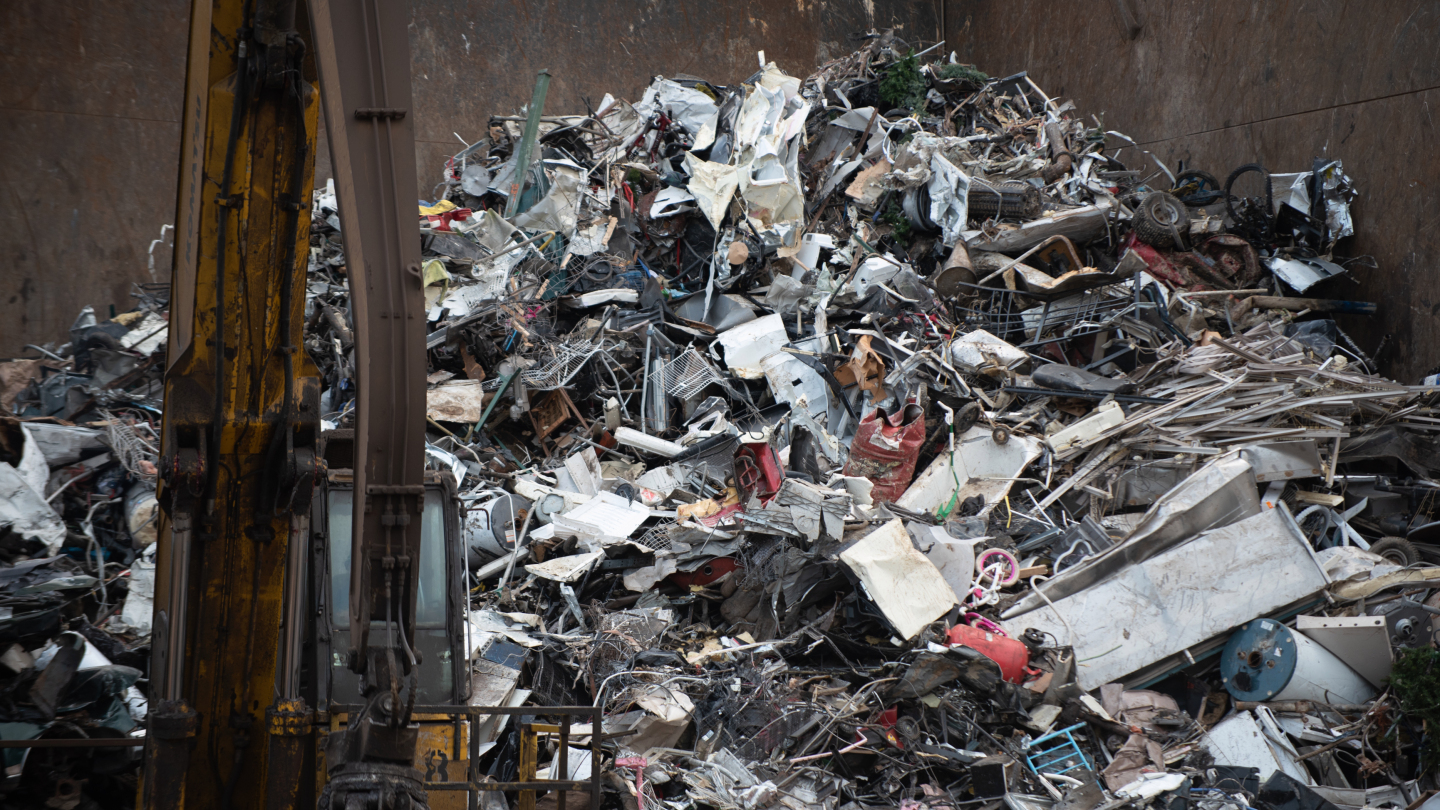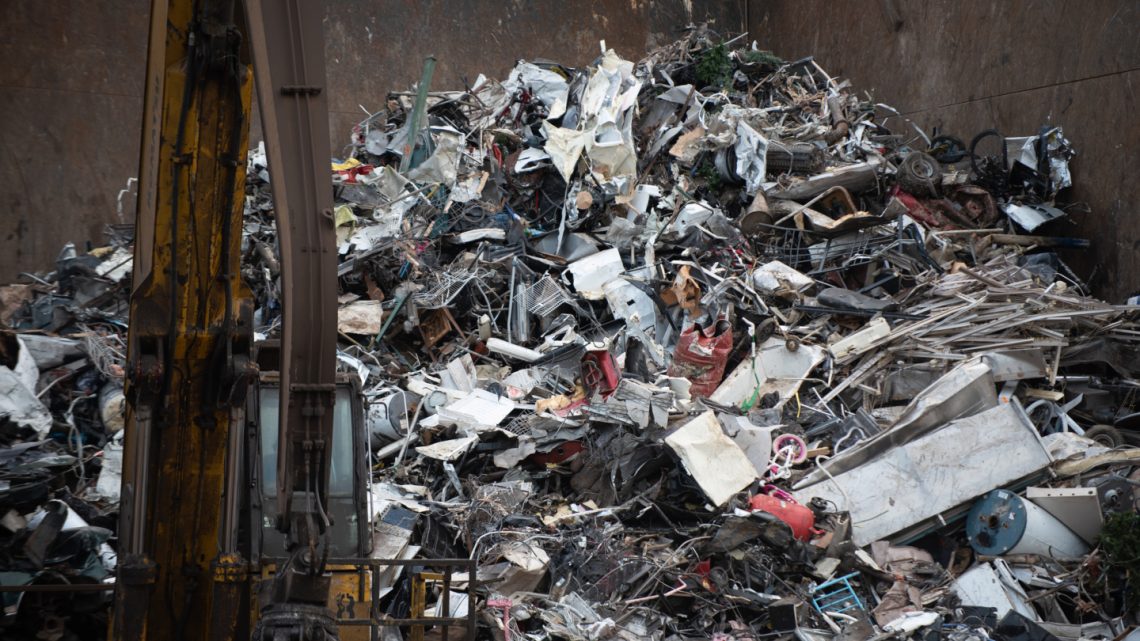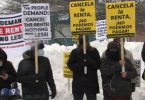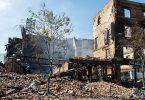
File Photo: The General Iron Industries in the Lincoln Park neighborhood in Chicago seen in April 2020. | Colin Boyle/Block Club Chicago
The recycler has been taking in and sorting metal since June 29, but it can’t resume shredding until repairs are made to equipment damaged in the May explosions.
LINCOLN PARK — General Iron’s non-shredding operations have been up and running since June 29, despite Mayor Lori Lightfoot’s assurances that the scrapyard remained closed pending an investigation into explosions at the Lincoln Park site.
After shutting General Iron’s entire operation down in May, citing the “immediate danger” posed by the site, the city’s building and fire departments allowed the company to partially reopen June 24.
Five days later, the scrapper began “intake, baling, sorting, separating, shearing, loading and exit of recyclable materials” — the allowed operations under the city’s modified closure order. The partial reopening was first reported by the Sun-Times.
General Iron officials praised the partial reopening, saying it allowed some employees to return from furlough.
“RMG is grateful that the city modified the closure order so we can provide non-shredding services,” spokesperson Randall Samborn said. “We appreciate the patience of all of our suppliers and employees at this time.”
The city is only allowing “very, very limited activity” at General Iron’s Lincoln Park site, Lightfoot said.
“I want to make sure that we’re clear about what the activities there are: The shredding operations remain shut, and they will not open anytime soon,” Lightfoot said. General Iron is “basically moving recycling material on and off the property, making sure they’re doing it in a way that doesn’t go into the neighborhood.”
Lightfoot did not clarify at her July 1 press conference that a portion of the scrapper’s operations had been allowed to resume. Two days after non-shredding operations resumed at the site, she only said that the Lincoln Park facility was shut down indefinitely.
Repairs to the pollution-limiting equipment that was the site of May’s explosions are underway. The site’s shredding operations cannot resume until repairs are completed, though the company expects to fix the equipment “sometime this month,” Samborn said.
Ald. Brian Hopkins’ 2nd Ward office was told last week General Iron would resume partial operations. He was not asked to weigh in on that decision, he said.
“My office has already weighed in repeatedly,” he said. “I made it clear that we should tell General Iron sooner than later that they will not be allowed to resume shredding during a respiratory virus pandemic. We still seem to have that option available.”
That the city quietly permitted General Iron to resume partial operations — and because Lightfoot won’t commit to keeping the plant closed once the RTO is fixed — suggests the city will allow the plant to reopen, Hopkins said.
“It suggests to me the city has already made its decision,” he said. “They will allow them to resume shredding. They haven’t told me that officially, but their actions speak louder than words.”
In an attempt to stop General Iron from fully reopening once repairs are complete, environmental activists with Clean the North Branch submitted a citizen resolution May 20.
The group called for Lightfoot to issue an executive order keeping the scrapper closed through the coronavirus pandemic, regardless of repairs. The mayor did not directly address the demand when asked about it July 1.
Even though the city is not allowing shredding, the limited operations have led to a return of “fluff,” a fugitive dust neighbors and Hopkins believe to be toxic.
Neighbor Lara Compton tweeted a video she says is of fluff blowing around the plant on Tuesday via her organization, Clean the North Branch.
“It just never ceases to amaze me, the resiliency of this company despite it polluting and hurting everybody so bad,” Compton said.
Samborn said Compton’s video does not depict fluff, but rather water mist being sprayed from water atomizing cannons that ring the facility’s perimeter.
“With no shredding there is no ‘fluff,’ ‘fuzz,’ or dust being created in such a manner as the tweeted video suggests, but the water cannons were being used yesterday to control dust and the mist travels in the manner depicted,” he said.
Neighbors frustrated by the lack of action against General Iron have been trying to get the plant closed since the start of the pandemic:
Timeline at General Iron:
- March 26: Neighbors call on Gov. JB Pritzker to remove General Iron from the list of “essential businesses” allowed to operate during the stay at home order.
- April 15: Neighbors ask Lightfoot to close General Iron during the pandemic: “It’s absurd that during this crisis we all try to protect the most vulnerable members of our community from the effects of a still largely uncontrolled and unknown disease. While at the same time, a well known and controllable risk factor continues to operate as an essential business at extended hours despite repeated violations.”
- May 18: An early morning explosion at General Iron sends two “booms” through the neighborhood and destroys a $2 million piece of equipment that brought General Iron into compliance. The Fire Department begins an investigation: “Work at the site has stopped as a result of the incident and will not resume until the city has determined the cause of the explosion,” a spokesman said.
- May 20: Lincoln Park neighbors introduce a “citizen resolution” to City Council asking for Lightfoot to order the scrapyard closed through the pandemic. Ald. Brian Hopkins (2nd) signs on as co-sponsor. The resolution is ignored.
- June 24: City officials quietly allow General Iron to partially resume operations in Lincoln Park.
- June 25: After months of opposition, Gov. JB Pritzker’s administration approves General Iron’s move to East Side.
- July 1: Mayor Lori Lightfoot won’t publicly commit to an executive order keeping the plant closed: “We’re still in the midst of doing our investigation. Once that investigation is complete, we will issue a report that will be public, and then we’ll go from there.”
This is not the first time the city has quietly issued work permits to heavy industry during a respiratory pandemic.
In April, city officials quietly signed off the botched demolition that covered Little Village in dust. The demolition at the old Crawford coal plant happened with little notice to neighbors.
A few weeks later, in mid-May, city officials quietly gave a contractor permission to perform an emergency demolition. Lightfoot stopped that demolition after protesters showed up at her Logan Square home.
Days later, however, the city issued a $40 million building permit to Hilco Redevelopment Partners, the developer who oversaw the botched Crawford demolition in April.
Subscribe to Block Club Chicago. Every dime we make funds reporting from Chicago’s neighborhoods.
Already subscribe? Click here to support Block Club with a tax-deductible donation.







